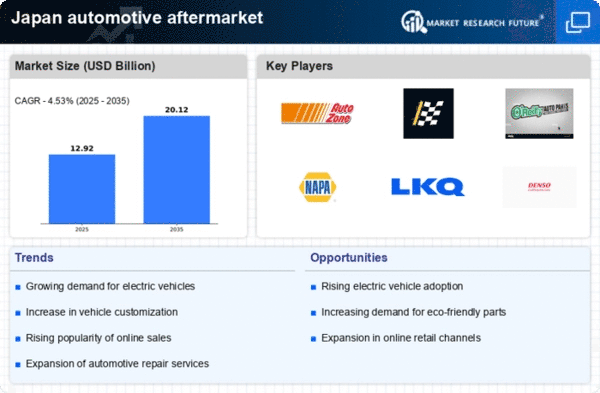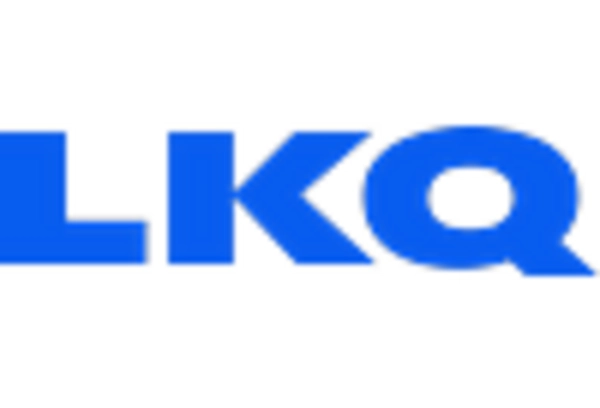Rising Vehicle Ownership
The increasing rate of vehicle ownership in Japan appears to be a primary driver for the automotive aftermarket market. As more individuals acquire vehicles, the demand for aftermarket parts and services is likely to rise. Recent statistics indicate that vehicle ownership in Japan has reached approximately 80% of households, suggesting a robust market for maintenance and repair services. This trend is further supported by the aging vehicle population, with many cars on the road exceeding 10 years of age. Consequently, the automotive aftermarket market is expected to benefit from the need for replacement parts, accessories, and specialized services, as owners seek to maintain their vehicles in optimal condition.
Regulatory Changes and Compliance
Regulatory changes in Japan are playing a crucial role in shaping the automotive aftermarket market. Stricter emissions standards and safety regulations are compelling vehicle owners to invest in aftermarket solutions that ensure compliance. For example, the Japanese government has implemented policies aimed at reducing carbon emissions, which may lead to increased demand for aftermarket parts that enhance fuel efficiency and reduce emissions. Additionally, compliance with safety regulations often requires the replacement of specific components, further driving the need for aftermarket services. As these regulations evolve, the automotive aftermarket market is likely to experience growth as businesses adapt to meet new compliance requirements.
Expansion of Online Retail Channels
The expansion of online retail channels is transforming the automotive aftermarket market in Japan. E-commerce platforms are becoming increasingly popular for purchasing automotive parts and accessories, providing consumers with greater convenience and access to a wider range of products. Recent data indicates that online sales in the automotive aftermarket market have surged, with estimates suggesting a growth rate of over 20% annually. This shift towards online shopping is likely to continue, as consumers appreciate the ability to compare prices and read reviews before making purchases. Consequently, businesses that adapt to this trend by enhancing their online presence and logistics capabilities may find significant opportunities for growth in the automotive aftermarket market.
Consumer Preference for Customization
The growing consumer preference for vehicle customization is emerging as a significant driver for the automotive aftermarket market. Japanese consumers increasingly seek to personalize their vehicles, leading to a surge in demand for aftermarket accessories and modifications. This trend is particularly evident among younger demographics, who view customization as a means of self-expression. Market data suggests that the customization segment of the automotive aftermarket market could grow by over 15% annually, as consumers invest in aesthetic enhancements and performance upgrades. This shift not only boosts sales for aftermarket suppliers but also encourages innovation in product offerings, as businesses strive to meet diverse consumer preferences.
Technological Advancements in Vehicles
The rapid advancement of automotive technology is significantly influencing the automotive aftermarket market. Innovations such as advanced driver-assistance systems (ADAS), electric vehicles (EVs), and connected car technologies are reshaping consumer expectations and service requirements. As vehicles become more sophisticated, the need for specialized aftermarket services and parts is likely to increase. For instance, the integration of EVs into the market is projected to grow, with estimates suggesting that EV sales could account for over 30% of total vehicle sales in Japan by 2030. This shift necessitates a corresponding evolution in the automotive aftermarket market, as businesses adapt to new technologies and consumer demands.

















